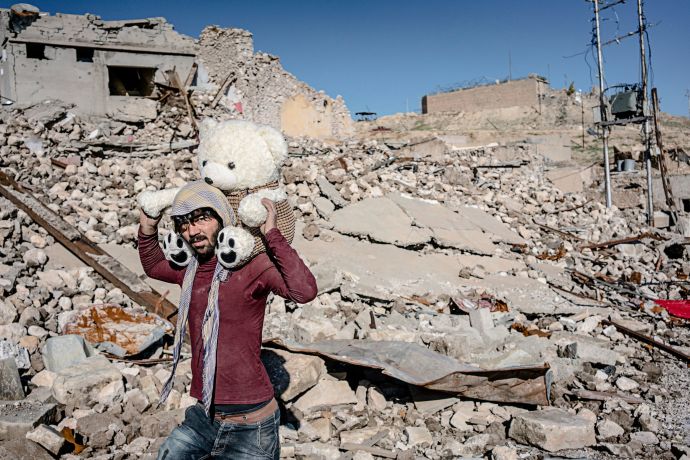Luke Mogelson reports from the border of ISIS territory, where Iraqi civilians fight for their survival.
When I visited the main junction in the center of town, however, three P.K.K. flags were mounted atop an empty billboard frame in the middle of a traffic circle. The highest one bore a portrait of Abdullah Öcalan, the leader and founder of the P.K.K., who is serving a life sentence in a Turkish prison. A pillar of Öcalan’s ideology is strict gender equality, both in society and on the battlefield, and about half of the P.K.K. fighters posted around the junction were women. Many of them—cigarettes in their mouths, Kalashnikovs on their backs, and grenades fastened to the sashes around their waists—looked no older than sixteen or seventeen. Shortly after we arrived, I heard one young woman yelling furiously. She was standing in the rotary, beneath the flag of Öcalan, facing several peshmerga soldiers.
“You don’t talk to me!” she told them.
A moment later, a swarm of P.K.K. fighters, Yazidi militiamen, and peshmerga troops were shouting at and jostling one another. It seemed to be about the flags. The peshmerga troops appeared to want to raise theirs.
“Stop! Stop! Stop!” someone yelled.
Many of the P.K.K. fighters had unslung their rifles and were holding them at the low ready. Others were propping machine guns on bipods behind vehicles and rubble piles. A man I had just been interviewing was stretched out on his stomach, aiming into the crowd.
“Hold on!” a peshmerga soldier shouted. “Don’t do this!”
“I’m going to raise our flag!” another said. “I want to raise our flag!”
“No, no, come back. Don’t do it.”
“Our home is destroyed, and now we’re going to destroy it again?” one of the Yazidi militiamen asked. “We should be fighting ISIS, not each other!”
Read the Full Report: The Front Lines – The New Yorker
